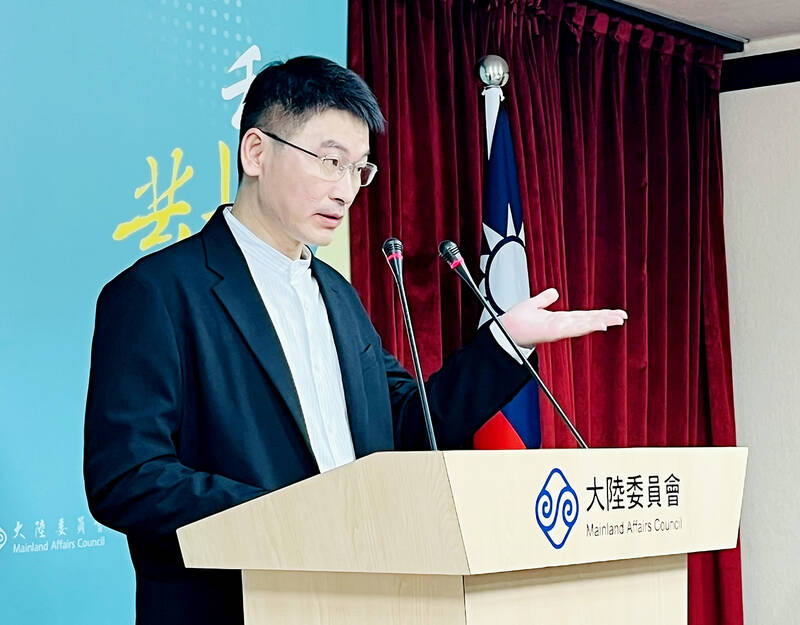Beijing’s claim regarding Taiwan’s trade barriers on goods from China is “a lingering historical issue” and should be resolved through WTO mechanisms, the Mainland Affairs Council (MAC) said on Thursday.
When both sides of the Taiwan Strait joined the WTO in the early 2000s, Taiwan already had restrictions on some products from China, MAC Deputy Minister Liang Wen-chieh (梁文傑) said.
“The issue was not addressed when both sides joined the WTO, so it has been a lingering historical issue since their accession,” Liang said, adding that the matters are not related to the Economic Cooperation Framework Agreement (ECFA), an agreement between Taiwan and China.

Photo: Chen Yu-fu, Taipei Times
As it is an historical issue left over from WTO accession, “we hope that both sides can follow the WTO mechanisms and sit down to negotiate,” he added.
Liang’s statement was in response to remarks made on Wednesday by China’s Taiwan Affairs Office spokesperson Chen Binhua (陳斌華), who said the office “firmly supports the relevant authorities in considering further measures based on the conclusions of the investigation into Taiwan’s trade barriers.”
“As for what those measures will be, please stay tuned,” Chen added.
The Chinese Ministry of Commerce on Saturday last week said that since the announcement of an investigation into Taiwan’s trade barriers on goods from China was published late last year, “the Democratic Progressive Party authorities have not taken any concrete steps to lift trade restrictions on the mainland.”
Authorities are considering adopting further measures based on the investigation, it added.
The ministry said in December last year it had determined that Taiwan had banned the import of more than 2,000 products from China as of November last year, which constitutes a trade barrier to China.
Taiwan has progressively opened its market to certain Chinese products, Liang said.
Throughout the years, many of the restrictions on Chinese goods have been removed, he said, without providing specific numbers or examples of the items allowed into Taiwan.
Chinese authorities are attempting to pressure Taiwanese businesses in China to continue their manufacturing or investment in China by mentioning the possibility of countermeasures in response to the supposed Taiwanese trade barriers, Liang said.
As foreign and Taiwanese businesses are gradually moving out of China, Beijing hopes to use the potential countermeasures to force Taiwanese companies to continue manufacturing or investing in China, he added.
“Actions by China may not necessarily have a direct connection with the so-called ‘trade barriers,’” Liang added.
China’s domestic demand is weak due to overproduction and low-price dumping, Liang said, adding that businesses in Taiwan competing with those in the affected sectors in China may also soon face the impact of potential countermeasures.
That includes sectors like petrochemicals, steel and textiles, Liang said.
“China is trying to resolve its problem of domestic overproduction,” he added.

A year-long renovation of Taipei’s Bangka Park (艋舺公園) began yesterday, as city workers fenced off the site and cleared out belongings left by homeless residents who had been living there. Despite protests from displaced residents, a city official defended the government’s relocation efforts, saying transitional housing has been offered. The renovation of the park in Taipei’s Wanhua District (萬華), near Longshan Temple (龍山寺), began at 9am yesterday, as about 20 homeless people packed their belongings and left after being asked to move by city personnel. Among them was a 90-year-old woman surnamed Wang (王), who last week said that she had no plans

TO BE APPEALED: The environment ministry said coal reduction goals had to be reached within two months, which was against the principle of legitimate expectation The Taipei High Administrative Court on Thursday ruled in favor of the Taichung Environmental Protection Bureau in its administrative litigation against the Ministry of Environment for the rescission of a NT$18 million fine (US$609,570) imposed by the bureau on the Taichung Power Plant in 2019 for alleged excess coal power generation. The bureau in November 2019 revised what it said was a “slip of the pen” in the text of the operating permit granted to the plant — which is run by Taiwan Power Co (Taipower) — in October 2017. The permit originally read: “reduce coal use by 40 percent from Jan.

China might accelerate its strategic actions toward Taiwan, the South China Sea and across the first island chain, after the US officially entered a military conflict with Iran, as Beijing would perceive Washington as incapable of fighting a two-front war, a military expert said yesterday. The US’ ongoing conflict with Iran is not merely an act of retaliation or a “delaying tactic,” but a strategic military campaign aimed at dismantling Tehran’s nuclear capabilities and reshaping the regional order in the Middle East, said National Defense University distinguished adjunct lecturer Holmes Liao (廖宏祥), former McDonnell Douglas Aerospace representative in Taiwan. If

‘SPEY’ REACTION: Beijing said its Eastern Theater Command ‘organized troops to monitor and guard the entire process’ of a Taiwan Strait transit China sent 74 warplanes toward Taiwan between late Thursday and early yesterday, 61 of which crossed the median line in the Taiwan Strait. It was not clear why so many planes were scrambled, said the Ministry of National Defense, which tabulated the flights. The aircraft were sent in two separate tranches, the ministry said. The Ministry of Foreign Affairs on Thursday “confirmed and welcomed” a transit by the British Royal Navy’s HMS Spey, a River-class offshore patrol vessel, through the Taiwan Strait a day earlier. The ship’s transit “once again [reaffirmed the Strait’s] status as international waters,” the foreign ministry said. “Such transits by